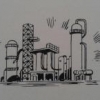In petroleum refinery nelson said, desalting is required when Crude salt is above 10 PTB. it shows when salt is less than 10 PTB then these salt will not cause/impact too much to overhead corrosion.
But in our case(Arabian light crude) we have always salt less than 10 PTB and after desalting we have salt in between 1-3 PTB but still we are facing too much problem in overhead system in which low thickness of overhead line frequently & condenser leakage problem etc. Although we are taking all measure to minimize corrosion like ,Corrosion inhibitor,NH3,Caustic,water wash etc.
My Question is that if 10 PTB is a thumb rule for desalting then why we are facing such type of problems?Either this thumb rule is not applicable?

 FB
FB












